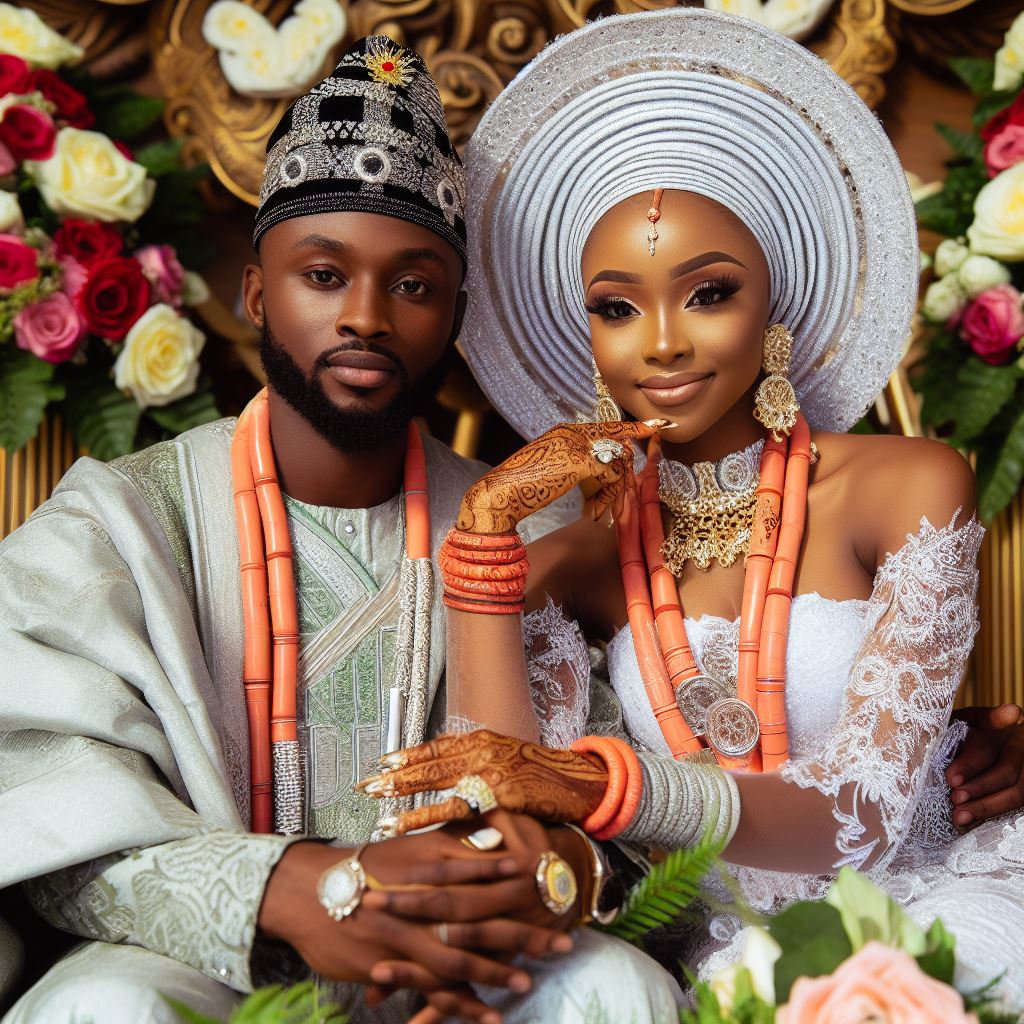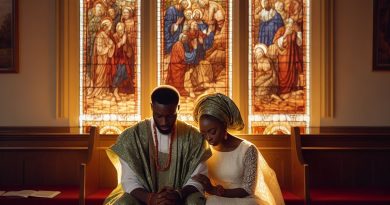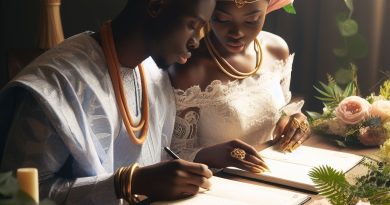Exploring the Societal Implications of Marriage in Nigeria
Last Updated on January 28, 2024
Introduction
Marriage in Nigeria is a binding contract between a man and a woman, solidifying their union and commitment to each other.
It is a legal and cultural institution that plays a vital role in Nigerian society.
In Nigerian culture, marriage is seen as a sacred and important milestone in one’s life. It is not just a personal choice but a duty towards family and community.
Marriage is considered a strong foundation for building a family, leading to the growth and development of society as a whole.
This blog post aims to delve into the various implications of marriage in Nigerian society.
Understanding how marriage impacts individuals, families, and communities is essential for comprehending the complex dynamics at play.
The societal implications of marriage can include social, economic, and cultural aspects.
The blog will further examine the influence of marriage on gender roles and expectations, as well as the role of marriage in shaping social norms and values.
Additionally, it will explore the influence of marriage on education, career opportunities, and financial stability.
Through analyzing the societal implications of marriage in Nigeria, a clearer understanding of the profound impact of this institution can be gained.
This post will shed light on the significance and relevance of marriage in Nigerian society, illuminating its role in shaping social structures and relationships.
Traditional marriage customs in Nigeria
In Nigeria, traditional marriage customs play a significant role in societal dynamics.
These customs consist of pre-marital practices, wedding ceremonies, and post-wedding traditions.
Traditional marriage customs in Nigeria reflect the richness of the country’s diverse cultures and traditions.
Pre-Marital Practices
Pre-marital practices are integral to Nigerian marriages.
Courtship rituals serve as a way for the couple to get to know each other and build a foundation of trust and understanding.
These rituals can include traditional dances, gift exchanges, and visits to the prospective bride’s family.
Another significant pre-marital practice is the payment of the bride price or dowry.
This custom involves the groom’s family presenting gifts or money to the bride’s family as a sign of respect and appreciation.
The bride price varies across different ethnic groups in Nigeria, but its importance lies in symbolizing the groom’s commitment to taking care of his future wife.
Wedding Ceremony
Wedding ceremonies in Nigeria are grand affairs filled with vibrant colors, music, and dances.
Traditional wedding attire varies depending on the ethnic group, with brides often wearing intricately designed clothing and accessories.
These outfits not only demonstrate the cultural heritage of the bride but also enhance the beauty and grace of the occasion.
During the wedding ceremony, the exchange of vows and rituals solidifies the union between the bride and groom.
Family members and community elders play important roles in conducting these rituals, ensuring that they adhere to traditional customs and values.
These rituals often include prayers, blessings, and the presentation of symbolic gifts.
Post-Wedding Customs
After the wedding, post-wedding customs focus on the involvement of the extended family.
In Nigerian societies, the extended family plays a crucial role in providing guidance and support to the newly married couple.
This support system helps navigate the challenges of married life and strengthens the bond between the couple and their families.
In addition, there are certain expectations placed upon the bride and groom.
The bride is expected to be respectful, submissive, and capable of maintaining the household, while the groom is expected to provide financial stability and protect his wife and children.
Although these expectations are evolving in modern Nigerian society, they still influence marital dynamics in traditional settings.
Basically, traditional marriage customs in Nigeria hold immense cultural significance and shape societal dynamics.
Pre-marital practices, wedding ceremonies, and post-wedding customs all contribute to the richness and diversity of Nigerian traditions.
These customs reflect the enduring values of love, commitment, and family, which remain integral to the institution of marriage in Nigeria.
Read: Marriage Expectations: From Singlehood to Matrimony in Nigeria
Social expectations and pressures related to marriage in Nigeria
Pressure to marry at a certain age
- The Nigerian society places a great deal of pressure on individuals to get married by a specific age.
- Parents, relatives, and even friends often expect young adults to settle down and start a family.
- There is a societal belief that marriage signifies maturity and success in life.
- Failure to get married at the expected age can lead to questioning, judgment, and criticism from others.
- Many Nigerians feel compelled to rush into marriage, even if they are not emotionally or financially ready.
Influence of cultural and religious values
- In Nigeria, cultural and religious values play a significant role in shaping societal expectations regarding marriage.
- Traditional practices and customs often dictate the ideal age and type of partner for marriage.
- Religious beliefs influence the importance placed on marriage as a sacred institution.
- Both culture and religion reinforce the notion that marriage is vital for social cohesion, continuation of lineage, and honor.
Stigma surrounding unmarried individuals
- In Nigerian society, there is a prevailing stigma against unmarried individuals, particularly women.
- Unmarried women are often viewed as incomplete or failures, unable to fulfill their gender roles.
- They may face gossip, judgment, and exclusion from certain social circles.
- Unmarried men may also face pressure but to a lesser extent, as they are often perceived as having more freedom.
Gender roles and expectations within marriage
- Marriage in Nigeria is deeply influenced by traditional gender roles and expectations.
- Men are generally expected to be the providers and decision-makers within the marriage.
- Women are expected to take on domestic responsibilities, including childbearing and housekeeping.
- These gender roles can put strain on couples and limit individual aspirations and potential.
- However, there is a gradual shift towards more egalitarian marriages, particularly in urban areas.
Generally, the societal implications of marriage in Nigeria are characterized by social expectations and pressures.
The pressure to marry at a certain age, influence of cultural and religious values, stigma surrounding unmarried individuals, and gender roles within marriage all contribute to a complex marriage landscape.
It is important for Nigerian society to recognize and respect individual choices and freedoms when it comes to marriage, enabling a more inclusive and progressive society.
Read: The Dynamics of Christian Marriages in Contemporary Nigeria
Economic implications of marriage in Nigeria
Financial responsibilities of the groom
- Paying bride price: The groom is expected to pay a bride price to the bride’s family, which can be a significant financial burden.
- Wedding expenses: The groom is responsible for covering the costs of the wedding ceremony and related expenses.
- Setting up a new home: After marriage, the groom is expected to provide a suitable home for his bride, which involves significant financial investment.
Financial benefits for the bride’s family
- Bride price: The bride’s family receives a financial payment, often referred to as the bride price, which helps to support the family economically.
- Dowry: In some cases, the bride’s family may request the payment of a dowry, providing additional financial benefits.
- Gifts and contributions: Relatives and guests at the wedding often provide gifts or monetary contributions, which can help the bride’s family improve their financial situation.
Impact on individual and family finances
- Financial stability: Marriage can contribute to financial stability as the combined incomes of both spouses can help meet expenses and build wealth.
- Sharing financial responsibilities: Both partners can share financial burdens, such as paying bills and supporting the family, leading to better financial management.
- Increased expenses: Marriage also brings additional financial responsibilities, including the costs of raising children, education, and healthcare.
Influence on social status and wealth accumulation
- Social status: Marriage in Nigeria is often seen as a sign of social status, with married individuals being perceived as more respected and responsible.
- Wealth accumulation: Marriage can be a means of accumulating wealth through the pooling of resources and joint investments.
- Access to networks and opportunities: Being married can provide individuals with access to a wider network of contacts and opportunities for career advancement or business partnerships.
Essentially, marriage in Nigeria has significant economic implications for both the groom and the bride’s family.
The groom has financial responsibilities, such as paying bride price and wedding expenses, while the bride’s family receives financial benefits in the form of bride price and gifts.
Marriage also impacts individual and family finances, leading to financial stability but also increased expenses.
Marriage influences social status and wealth accumulation by providing access to networks and opportunities.
Read: The Evolution of Marriage Definitions in Nigerian Cultures

Learn More: From Engagement to Marriage: Nigerian Love Sayings
Challenges faced by married couples in Nigeria
Communication issues
- Lack of effective communication can lead to misunderstandings and conflicts within marriages.
- Cultural barriers and societal expectations can hinder open and honest communication between spouses.
- Failure to communicate needs, desires, and concerns often results in unresolved issues in marriages.
- Lack of communication skills can lead to emotional distance and a breakdown of trust between partners.
- Addressing communication issues is crucial for building a strong and healthy marital foundation.
Gender inequality and domestic violence
- Nigeria’s patriarchal society often fosters a culture of gender inequality within marriages.
- Traditional gender roles can limit the autonomy and decision-making power of women in marriages.
- Domestic violence remains a significant challenge, with women being the primary victims.
- Power imbalances can perpetuate abusive behaviors, further endangering the lives of women.
- Efforts to address gender inequality and domestic violence are vital for promoting safer marriages.
Infidelity and polygamy
- Infidelity is a prevalent issue in many marriages in Nigeria, causing emotional distress and trust issues.
- Some cultural beliefs sustain the notion that men can have multiple wives, leading to polygamous marriages.
- Polygamy can lead to jealousy, competition, and emotional turmoil among spouses and their children.
- Infidelity and polygamy can weaken the marital bond and result in the breakdown of marriages.
- Addressing these challenges requires promoting fidelity and reevaluating cultural norms surrounding marriage.
Lack of legal protections for women in marriage
- Nigerian laws often fail to provide adequate protections for women in marital relationships.
- Women may experience discrimination in inheritance rights, divorce proceedings, and child custody battles.
- The absence of legal safeguards perpetuates vulnerability and limits women’s agency within marriages.
- Reform is necessary to ensure equal rights and protections for women in Nigerian marriages.
- Advocacy for legal changes can contribute to a more equitable and just marital system.
In review, Nigerian marriages face various challenges that impact the well-being of couples.
Communication issues, gender inequality, and domestic violence, infidelity and polygamy, and the lack of legal protections for women are important challenges that need to be addressed.
By promoting open communication, gender equality, fidelity, and advocating for legal reforms, Nigeria can foster healthier, more equitable marriages for its citizens.
Read: Marriage Rites and Celebrations in Major Nigerian Tribes
Changing perspectives on marriage in Nigeria
Influence of globalization and urbanization
- Globalization and urbanization have led to the adoption of more liberal and modern views on marriage.
- Exposure to different cultures and ideas has challenged traditional notions of marriage in Nigeria.
- Younger generations are influenced by Western ideals of love, romance, and individual choice in marriage.
Increase in inter-religious and inter-ethnic marriages
- As Nigeria becomes more diverse, there is a rise in marriages between people of different religions and ethnicities.
- Inter-religious and inter-ethnic marriages promote unity and tolerance among different groups.
- These marriages often require couples to negotiate and navigate cultural and religious differences.
Role of education and economic empowerment
- Education and economic empowerment of women have been instrumental in changing perspectives on marriage.
- Women with higher levels of education and financial independence are less likely to prioritize marriage.
- Education empowers women to make informed choices about their lives, including marriage.
Shift towards companionate marriages
- There is a growing emphasis on mutual love, friendship, and companionship in marriages.
- Traditional arranged marriages are giving way to marriages based on personal compatibility and emotional connection.
- Couples are more likely to prioritize happiness, equality, and shared interests in their relationships.
In essence, the societal implications of marriage in Nigeria are evolving as perspectives continue to change.
Globalization and urbanization have introduced new ideas and values, challenging traditional views.
Inter-religious and inter-ethnic marriages foster unity and tolerance.
Education and economic empowerment have empowered women to make choices about their lives, including marriage.
The shift towards companionate marriages highlights the importance of love, compatibility, and mutual happiness in relationships.
Conclusion
Exploring the societal implications of marriage in Nigeria has revealed various challenges and opportunities.
Throughout this blog post, we have discussed how marriage plays a central role in defining an individual’s identity, social status, and familial relationships.
We have also explored the unequal power dynamics within marriages, the prevalence of gender-based violence, and the socioeconomic effects of divorce.
Understanding and addressing these implications is crucial for the personal well-being and growth of individuals, as well as for the development of a more egalitarian society.
By acknowledging and breaking down gender norms and stereotypes, we can create a healthier and more equitable environment for married couples.
Furthermore, it is essential for society to recognize the need for support systems and legal protections for individuals in challenging marital situations.
By implementing policies and initiatives that address domestic violence, promote gender equality, and provide counseling and mediation services, we can foster healthier and more sustainable marriages.
In light of these findings, we urge individuals to prioritize open and honest communication, mutual respect, and equality within their marriages.
It is vital to invest time and effort in understanding and supporting each other’s aspirations, dreams, and personal growth.
In a nutshell, marriage in Nigeria carries profound societal implications that require sincere efforts from individuals, communities, and policymakers to address and mitigate.
It is our collective responsibility to create a society where everyone has the opportunity to experience love, respect, and equality within the institution of marriage.


